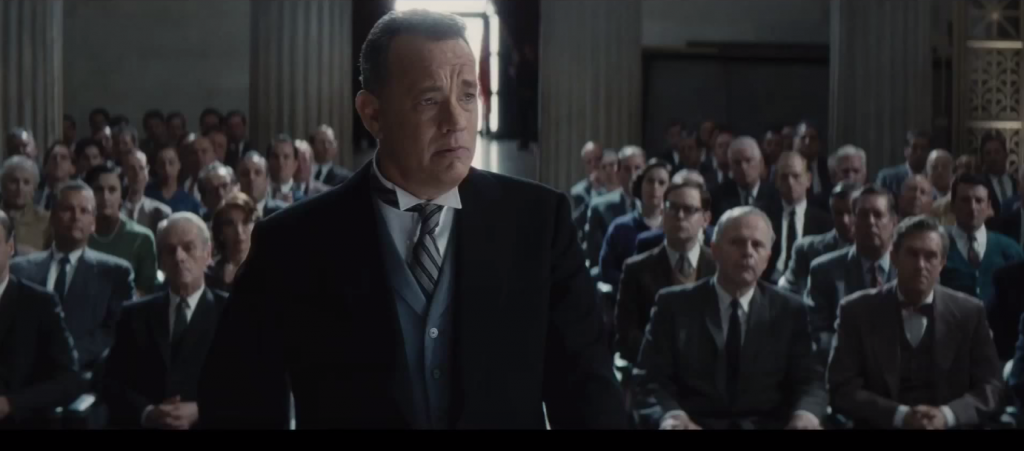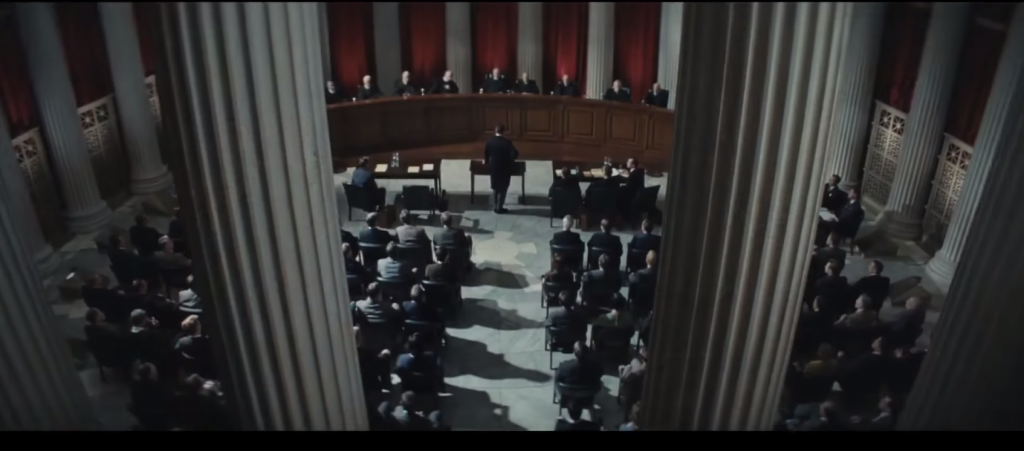I saw the Tom Hanks/Steven Spielberg movie Bridge of Spies. It was an excellent lawyer movie. Beyond the scene in the Supreme Court, which I blogged about two weeks ago, the movie was a stirring defense of the Constitution. (There are some spoilers in here, so stop reading if you want to watch the movie).
In one scene, after he began the representation of Abel, a CIA agent follows Donovan. The agent asks Donovan what Abel told him in confidence. Donovan replies, “We are not having this conversation.” The agent chuckles, and says, sure, we never had this conversation. Donovan replies, “I mean it. We are not having this conversation.” Donovan then offers a stirring defense of the attorney client privilege, and explains why nothing divulged by his client would be revealed. Donovan then explains that we all live by a rulebook–the Constitution. “It’s what makes us all Americans.’ The CIA Agent says something like, “Do we need to worry about you?” in a threatening manner. Donovan stares him down, and walks away. Bravo.
In another touching scene, Donovan’s son is freaking out about the threat of thermonuclear war. He drew a blast radius emanating from the Empire State Building, and tried to figure out if their Brooklyn home would be destroyed. The young son asks Donovan, why he was defending a spy. Donovan explains the importance of everyone getting a fair defense. The son does not seem persuaded.
In one of the more poignant scenes, Donovan has the initial hearing with the Judge Byers and the AUSA. The judge sets trial for three weeks away. Donovan respectfully asks for six weeks, so he has enough time to prepare a defense. The judge says something to the effect of “What are you doing?” The judge admits that he thinks the defendant is guilty, and tells Donovan that he should have a competent defense, but they should not delay the inevitable. Later there is another scene with the same judge where Donovan tries to exclude evidence seized from Abel’s apartment. Donovan argued that the INS officers only had an administrative warrant for deportation, which did not allow them to search his hotel room. Donovan’s argument was a bit muddled–I heard something about Yick Wo and a poisonous tree–but he made the argument well enough. The Judge scoffed at him, and said Abel was guilty, and should be executed. His courtroom was not to be used for such antics. The motion was denied in chambers. In reality, Judge Byers wrote a four-page decision at 155 F.Supp. 8, and found that the arrest under the deportation warrant was made in good faith, and the evidence was lawfully seized.
After Abel was convicted by the jury, Donovan visits the house of the judge, and tries to talk him out of sentencing Abel to death. The judge at first doesn’t seem interested. Then Donovan says that at some point, an American spy will be captured by the Soviets. Abel can then be used as a bargaining chip to get an American back. Abel isn’t much use dead. The judge seems persuaded, and ultimately sentences him to 30 years in jail. The courtroom erupts with that sentence, as people scream out that Abel should be sent to the gallows.
After the sentence, Donovan tells the managing partner at his firm (played by Alan Alda) that he is going to appeal the exclusion issue. (Donovan was an insurance lawyer, but one who had served as a prosecutor at Nuremberg). Alda was furious. He said that Abel received a competent defense at trial, and avoided an execution, but that Donovan should not waste his time appealing the case. Donovan did appeal. In the movie they went straight to the Supreme Court. I suppose the 2nd Circuit isn’t sexy enough. (CA2 issued a 17-page decision affirm the admission of the evidence at 258 F.2d 485).
The scene in the Supreme Court was aesthetically-realistic, as I noted in my previous post. Donovan spoke uninterrupted for about 2 minutes. He began, “Mr. Chief Justice, and may it please the Court.” I can’t quite recall what he said, as it wandered about with much legal resonance, but it was delivered well.
The second half of the movie follows Donovan as he attempted to negotiate Abel’s release for an American spy pilot, who was shot down over the Soviet Union. Donovan’s commitment to his client is astounding, as he puts his own life in jeopardy as he travels to East Germany to arrange the transfer over the “Bridge of Spies.” In one of the first scenes in the movie, Donovan tells Abel that he doesn’t represent the United States, the government, or anyone else. And that was the truth. He represents Abel–and he is probably the only person in America who doesn’t want him killed. This was an excellent lawyer’s movie. The plot was a bit slow, and dragged at times, but I really enjoyed watching it.

